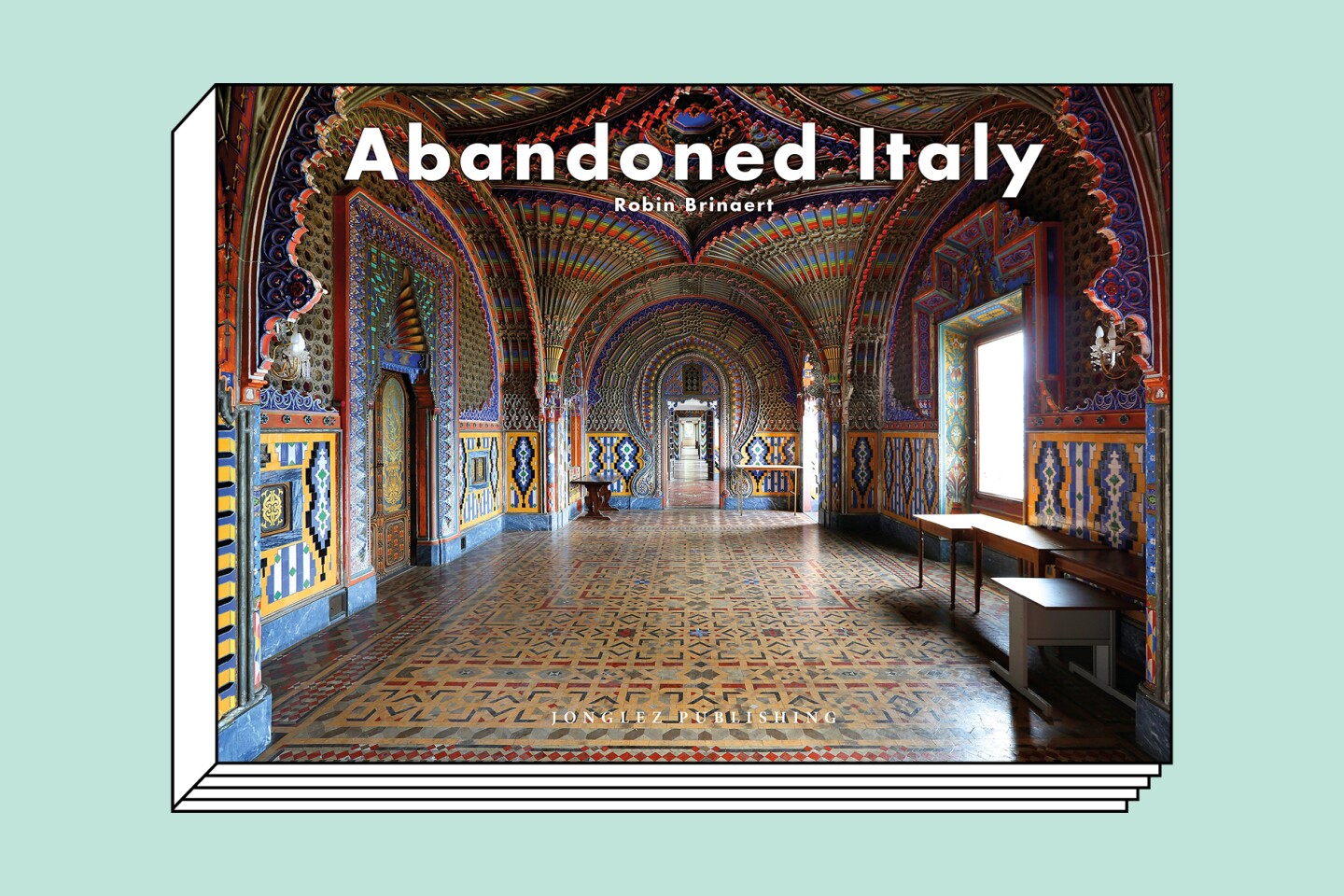Italy and its wonders have been the stuff of legend since before the poet Virgil wrote the Aeneid more than 2,000 years ago. Although we suspect you don’t need much additional inspiration to get you dreaming of everyone’s favorite boot-shaped country, here are 14 books, including a few classics, just in case.
“Italian Ways: On and Off the Rails From Milan to Palermo” by Tim Parks (2013)
- Buy now: bookshop.org
Parks, a British novelist, has long lived in and written about Italy. In this travelogue by train, he makes pungent and entertaining observations from the perspective of someone who is not a native but loves his adopted home. It is partly a casual guide to using the Trenitalia national rail system, part personal memoir of a keen observer.

“Tuscany: Simple Meals & Fabulous Feasts From Italy” by Katie & Giancarlo Caldesi (2018)
- Buy now: amazon.com
Married couple Giancarlo (an Italian restaurateur) and Katie Caldesi (a British artist) bring Tuscan cooking to life in this collaboration. Master the fundamentals, like how to make a great soffritto or tomato sauce, or get more complex by attempting your own filled ravioli. The colorful pages and tasty recipes, culled from the pair’s years of expertise honed in their own restaurants and cooking schools, are as enticing as a panna cotta on a summer day in Pisa.
“Beautiful Ruins” by Jess Walter (2012)
- Buy now: bookshop.org
This novel is set in a fictional town—Porto Vergogna—near the famed Cinque Terre, in the early 1960s. Porto Vergogna hopes to expand the Cinque Terre from five to six; alas, it only has proximity going for it. Walters is a novelist always worth reading, but this is his only novel set in Italy. OK, partly set in Italy. It jumps back and forth in time and place with “recent” Los Angeles and a few other places. However, once you encounter the aspirational Hotel Adequate View and its Italian owner in the first chapter, you will want to read it all.

“The Eight Mountains” by Paolo Cognetti (2017)
- Buy now: bookshop.org
The 2017 winner of Italy’s esteemed Strega Prize for fiction gets an English translation here. The first-person novel revolves around Pietro, a boy from Milan, and the friendship he develops with Bruno, a boy whom he meets while trekking in the Dolomites with his family. But it’s also a coming-of-age narrative that grapples with Pietro’s relationship with his father and the mountains they both love.
“Renaissance Woman: The Life of Vittoria Colonna” by Ramie Targoff (2018)
- Buy now: bookshop.org
In this biography of Italian poet and noblewoman Vittoria Colonna, Dr. Ramie Targoff, professor of English at Brandeis University, peers into the life of one of the most remarkable women from the Renaissance. Targoff draws readers into the world of 16th-century Italy, exploring how Colonna became a sonneteer and befriended popes and artists alike (her most notable friendship was with Michelangelo himself).
“Everyone in Their Place” by Maurizio de Giovanni (2013)
- Buy now: bookshop.org
This is the third of the “four seasons” series of mysteries featuring Commissario Ricciardi. The setting is early 1930s Naples. An impending visit by Benito Mussolini adds urgency to solving the murder of a duchess linked to the local social and fascist elite. The author, a native of Naples, uses his knowledge of the city to bring it to life.

“Bella Figura: How to Live, Love, and Eat the Italian Way” by Kamin Mohammadi (2018)
- Buy now: bookshop.org
Ten years ago, Kamin Mohammadi was laid off her job as an editor in London. A friend offered her use of an apartment in Florence, and so she went to Tuscany. Bella Figura takes readers along for that first year of Italian living, in which Mohammadi learns the value in living life at a slower pace. The story is intimate, with stories about falling in love with the place but also heartbreak. Chapters are divided by month and begin with a nice little inventory: In January, the scent of the city is woodsmoke; her new Italian word of the month is salve. At the end of each chapter are recipes.
“Eating My Way Through Italy: Heading Off the Main Roads to Discover the Hidden Treasures of the Italian Table” by Elizabeth Minchilli (2018)
- Buy now: bookshop.org
A resident of Italy for 30 years, Elizabeth Minchilli has become an expert on the country’s cuisine. In Eating My Way Through Italy, she provides the tools for readers to get off the beaten path, as the book’s subtitle suggests. Divided geographically, written conversationally, and even including tips for where to stay, Minchilli’s book reminds readers how distinct—and delicious—Italy’s regional cuisines are.
“Memoirs of Hadrian” by Marguerite Yourcenar (1951)
- Buy now: bookshop.org
This absorbing historical novel is an “autobiographical letter” written by Emperor Hadrian to his successor, Marcus Aurelius, as Hadrian recalls his life and his love for handsome young Antinous. If all you know about this emperor of ancient Rome is Hadrian’s Wall (begun in 122 C.E. after Hadrian visited Britain), you will want to learn more about him and his era.

“Venice Stories” edited by Jonathan Keates (2018)
- Buy now: bookshop.org
Short stories and excerpts from longer works about Venice make up this addition to the Everyman’s Library Pocket Classic Series. From the 18th-century writings of the one-and-only Casanova to a vignette set in Venice during the Napoleonic era, written by Lambda Literary Award–winner Jeanette Winterson, the collection crafts a masterful portrait of the floating city. Another plus: the spooky “Don’t Look Now” story by Daphne du Maurier, which inspired the atmospheric 1973 movie of the same name.
“SPQR: A History of Ancient Rome” by Mary Beard (2015)
- Buy now: amazon.com
One of the most acclaimed works by popular British historian Mary Beard, SPQR takes its title from an abbreviation for Senatus Populusque Romanus, meaning the senate and people of Rome. Beard covers more than 900 years of Roman history, which could be a trudge in the hands of a lesser writer. While noted figures like Augustus and Caligula appear, her focus is more on the lives of Rome’s ordinary residents. Prefer to focus on the rulers? See her latest book, Emperor of Rome: Ruling the Ancient Roman World (2023), or read her illustrated art history Twelve Caesars: Images of Power From the Ancient World to the Modern (2021). This former Cambridge classics professor has a talent for making ancient history accessible and engaging for general readers.
“Sicilian Splendors: Discovering the Secret Places That Speak to the Heart” by John Keahey (2018)
- Buy now: amazon.com
Consummate traveler John Keahey, who has roamed Italy for decades and penned books about Tuscany and Venice, turns his inquisitive eye to Sicily. In a travelogue that’s both personal and historical, even a quest for procuring new shoelaces in a small town teaches about local legend and hospitality. Keahey encounters enthusiastic and welcoming characters everywhere, and readers get a glimpse of Tyrrhenian coasts they may have never seen before. He also contextualizes the island’s rich and complex history and sees beyond Sicily’s mafia-laden stereotypes to reveal its warm heart.

“Abandoned Italy” by Robin Brinaert (2018)
- Buy now: amazon.com
For eight years, Robin Brinaert has traveled Italy seeking abandoned places, the skeletons of buildings much more modern than the Colosseum. This photo book showcases the results of this quest, revealing places throughout Italy—a duchess’s hunting lodge, an old Pinocchio film set, a former asylum—and uncovering backstories that allow readers to see Italian ruins through a different lens.
“The Stones of Florence” by Mary McCarthy (1959)
- Buy now: bookshop.org
This singular history is not a new book, but its subject is timeless. And you may well wish you had visited the city some 60 years ago before it became overrun by tourists. Not that Florence has ever lacked for admiring visitors. Try to get a hold of the illustrated edition published later. Stones of Florence began as a long essay in The New Yorker; it has gone on to become a classic of insight about its famous city.
This article was originally published in 2018 and most recently updated on December 19, 2023, with current information.











